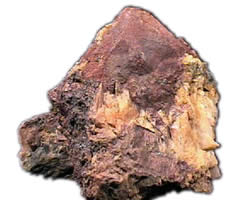Thorium is the 36th most abundant element on Earth. It is four times more abundant than uramium. There has been no concerted international effort to exlplore for deposits thorium ores. Accurate estimates of world reserves of thorium are not available. Known thorium deposits could supply a major part of the Earth’s energy needs for hundreds of years. Some estimates are as high as 1000 years at current world energy use. There are deposits of thorium in Australia, Brazil, Canada, Greenland, India, South Africa and the United States.
In the U.S., it is estimated that there are 300,000 tons of thorium ore, half of which is easily extractable. The 150,000 tons that are readily available are equivalent to about 1 trillion barrels of oil. This is over 5 times the estimated oil reserves of Saudi Arabia. Two companies currently have major thorium ore claims, one in the mountains on the border between Idaho and Montana and the other in the Pea Ridge area of Montana.
The most common thorium ore is a phosphate ore called monazite which can contain up to 12% thorium. The known reserves of monazite are esimated to be up to 1.2 million tons. Two thirds of these reserves are in heavy mineral sands on the south and east coasts of Indian. Monazite ore also contains important strategic rare earth metals such as creium, lantahnum, neodymium, yttrium and iridium.
Currently thorium is considered a waste product of processing of rare earth metals. It is thrown away with the rare earth mine tailings. The U.S. has recently imported thorium from France that was produced as a by-product of rare earth ore processing.
There currently over 3000 metric tons of processed thorium nitrate buried in the Nevada dessert at the Frenchman Flats area of the Department of Energy site. This material was generated by the U.S. nuclear program between the years of 1957 and 1964. It was contained in 21,000 drums which were buried in pits with twenty feet of soil over them. This thorium could conceiveablely recovered and used to create nuclear fuel to jump start a thorium reactor program.
It is difficult to estimate the ultimate cost of thorium as a fuel supply for nuclear reactor. It is not currently being mined for fuel but there are known bodies of ore that could be easily exploited. Thorium would be much less difficult and expensive to process than uranium because the naturually occuring thorium is mainly one isotope and does not have to be enriched. This means that one ton of thorium can produce the energy of 200 tons of uranium. In addition, the rare earths that can be recoved during thorium mining and processing are valuable and would lower the cost further.
Thorite ore from Ontario:
